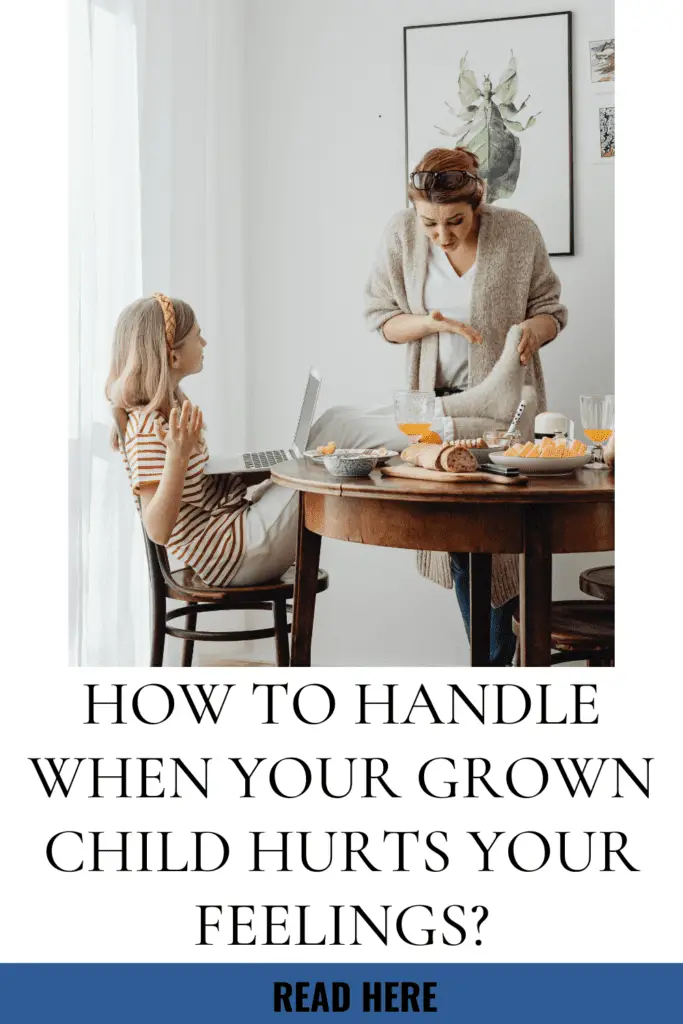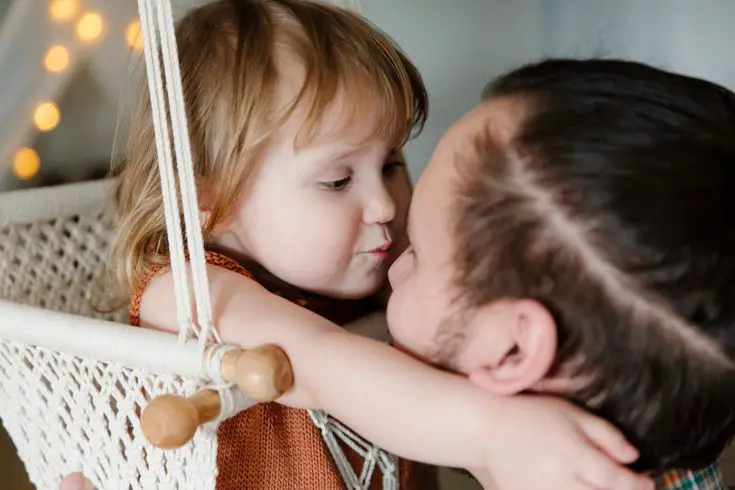Parenthood is filled with joy, challenges, and sometimes unexpected emotions – a life-long journey with no expiration date.
When you think you’ve MASTERED the art of raising, your child grows up and ventures into adulthood.
While watching your child’s independence and self-discovery is a PROUD MOMENT, it also brings some challenging moments, especially when your grown child hurts your feelings.
These moments leave many parents SCRATCHING their heads and wondering: How to handle when your grown child hurts your feelings?
Worry not!
Today, in this article, we will discuss why your adult child is trying to hurt your feelings and how can you handle it.
So, without further ado, let’s begin!


Why Is Your Adult Child Trying to Hurt Your Feelings?
Understanding the EVOLVING CONNECTION between parents and grown kids can sometimes be tricky.
It’s okay to question why your adult child, the one you’ve supported and cared for, would try to hurt your feelings.
Even though it might be hurtful and confusing, there are reasons behind their actions that can shed light on why they behave this way.
Let’s discuss these reasons in detail.
Communication Breakdown Is a Common Trigger
Good communication is crucial in any good relationship, yet it’s a challenge even families can face.
Sometimes, things get mixed up, misunderstood, or just not said right, and that can really hurt.
Grown children might have different communication because of their age or what they’ve been through. They might say or do things that cause unintended emotional harm.
Fixing this isn’t a QUICK FIX; you must have patience and understanding.
Instead of reacting defensively, try to understand how they talk and share what you need.
Tell them to do the same.
Make a space where you both can talk and listen so you both feel HEARD and VITAL, which ultimately stops problems before they happen and makes sure nobody gets hurt.


Unresolved Childhood Problems Are the Roots of Hurtful Behavior
Growing up, the experiences we go through can really shape who we become emotionally. Whether it’s good times or tough ones, those CHILDHOOD EXPERIENCES stick with us.
And guess what? They can creep into our adult lives, affecting how we act and feel.
So, let’s say your child had some TRICKY MOMENTS when they were growing up. Maybe they had issues with brothers or sisters, had a tough time at school, or felt left out.
Well, it turns out, those things can come back to DISTURB them in their grown-up interactions.
Understanding this connection becomes a secret decoder that helps you understand why your grown child behaves that way.
After all, we’re all just trying to figure out the ups and downs in this emotional adventure we call life, right?
Struggling with Independence Can Be a Problem
As children grow into adults, the search for independence becomes their central theme.
Although it is necessary and healthy, sometimes it causes problems we didn’t mean to happen.
It is because when your adult children are trying to be their boss, they might hurt your feelings without even knowing it.
Maybe they just want to be their own person, or there’s some mix-up in how they talk to you during this change.


Emotional Distance from Your Grown Child Allow Him to Hurt Your Feelings
Emotional distance can sometimes develop between parents and their grown children. It’s not because they DON’T CARE about each other anymore, but more like life is doing its thing.
Adults get busy with jobs, relationships, and their own stuff.
And without even realizing it, they might DRIFT from the close bond they used to have with their parents. This can leave parents feeling sad because they miss the STRONG CONNECTION they once had.
But here’s the deal: communication is the key.
Keeping those conversations going, sharing what’s happening in life, and showing interest in each other helps patch up that emotional gap.


Sibling Rivalry Is a Surprise Source of Pain
Sibling relationships are complex, influenced by a mix of love, rivalry, and shared history. They can be awesome but can also become a source of hurt feelings if not managed properly.
As we grow up, those old rivalries we thought were buried can POP UP again, causing emotions to RUN HIGH.
Therefore, it’s essential to create an atmosphere of respect and good communication between siblings from the beginning.
Tell them it’s cool to talk about any past fights, give a nod to each other’s personal growth, and try to build healthy relationships that match your shared values and dreams.

How to Handle When Your Grown Child Hurts Your Feelings?
Parenting doesn’t come with a MANUAL.
As your child grows into an adult, a lot of things between you and them change.
One of the challenges many parents face during this phase is figuring out what to do when their grown child hurts their feelings.
It’s a DELICATE SITUATION that requires understanding, communication, and a willingness to adapt to the evolving nature of your connection.
Let’s discuss some ways to deal with such hurtful emotions.
Process Your Emotions Before Reacting
When confronted with hurtful actions from your grown child, it can hit you hard. You may feel a WHOLE BUNCH of emotions rushing in all at once.
It’s okay to feel that way – we are all just people who sometimes get emotional.
What’s essential in this case is to take some time and give yourself space to figure out what’s happening inside.
Getting my point?
Just step back and try to understand why you feel that way.
Don’t suppress your feelings; instead, give them a chance to settle so your response can be more thoughtful and composed.
This way, when you respond, it’s not a knee-jerk reaction but a more composed and thoughtful reaction.


Try Not to React When Emotions Are High
When things get tense, we might feel tempted to react quickly without thinking. But hold on a sec — doing that can just make things worse and mess up your chance for a good chat.
So, instead of going off the rails, try to remain calm and peaceful.
Give yourself a moment to pause and consider the POTENTIAL OUTCOMES of your response.
Trust me, saying or doing stuff when your emotions are high can come back to HAUNT you later.
So, how about trying the calm and collected route?
It leaves space for a way better conversation to happen.


Try to Understand Their Perspective
When hurt by your grown child’s actions, it’s totally normal to think about your feelings. But, if you take a moment to understand their perspective as well, it can really help.
People do things for reasons tied to their own experiences and feelings.
So, try having a friendly and open chat with your child. Ask them what they meant by what they did.
This approach not only shows you’re ready to listen but also might REVEAL THEIR MOTIVES you didn’t realize at first.
Talking it out can make things clearer for both of you.
Nurture a Healthy Relationship
Maintaining a friendly relationship with your grown child can be key to handling hurtful situations.
Nurture an environment of WARMTH and APPROACHABILITY and remind them that you are a parent as well as a caring friend.
Engage in activities you both enjoy, share light-hearted conversations, and show genuine interest in their lives.
This way, you build a tight connection based on trust and comfort.
It makes both of you address difficult topics without fear of judgment or fights.


Express How Their Behavior Impacted You
Letting your child know how their actions affected you emotionally can be a POWERFUL WAY to promote understanding.
Share your feelings openly and honestly, like:
“Hey, when you did that, it really made me feel upset.”
When you talk about it, try using “I” statements to keep things personal and AVOID POINTING FINGERS. You want them to understand you, not feel you are attacking them.
And that way, you’re not saying they’re a BAD PERSON; you’re just sharing your side of the story.
Isn’t that awesome?
- When they see how their actions affected you, they might start understanding why it matters.
- That little understanding can spark empathy in them.
- Suddenly, they’re not just thinking about what they did; they’re thinking about how it landed on you.
This whole sharing-your-feelings thing isn’t about blame or making them feel guilty. It’s more like opening a window into your world.
Remember, You Aren’t Always Right
We all make mistakes, even parents and grown children – it’s just part of human nature.
Therefore, when discussing hurtful situations, admit if you have also made mistakes. Saying, “Hey, I mess up sometimes,” makes things more open between you.
This vulnerability can encourage your grown child to do the same, nurturing an environment of MUTUAL ACCEPTANCE and growth.
Avoid Holding Grudges
Holding onto grudges can be DAMAGING to both your emotional well-being and the relationship with your grown child.
While it’s natural to feel hurt initially, carrying that hurt as a grudge can poison your interactions. Therefore, try to shift gears and concentrate on finding solutions and moving forward.
Let go of the resentment and remind yourself that everyone is capable of change and improvement.
Set Healthy Boundaries
Healthy boundaries are crucial for any relationship, even between parents and children.
Clearly define what behaviors are acceptable and unacceptable. Communicate these boundaries calmly and respectfully.
Boundaries ensure that both parties,
- Understand each other’s limits
- Promoting respect
- Preventing future hurtful actions
NOTE: Remember, boundaries are not about control but about creating a balanced and respectful relationship.
Encourage Compromises and Solutions
When you grapple with tough situations regarding your child, aim for the RESOLUTION that works for both of you.
Encourage open discussions about finding compromises and solutions. Listen to their suggestions and share your own.
Collaboration helps to BRIDGE THE GAP between generations and promotes a sense of unity.
By working together to find common ground, you show that the relationship is a priority, even in challenging times.

FAQs
What Are Signs of a Disrespectful Child?
A disrespectful child may show signs like talking back, ignoring rules, or being rude.
They might interrupt conversations, refuse to listen, or display defiance.
Watch for disrespectful gestures and eye-rolling and address these behaviors with gentle correction, teach empathy, and set clear expectations.
Building a loving environment with open communication helps guide them toward respectful behavior.
How Do You Deal with a Disrespectful Grown Child?
Dealing with a disrespectful grown child involves the following:
- Address the issue calmly.
- Have an honest conversation and express your feelings and expectations.
- Also, set boundaries and consequences for disrespectful behavior.
- You can also seek professional advice if needed.
It’s tough, but showing love while maintaining firmness can help rebuild respect and mend the relationship over time.
How Do You Deal with an Unhappy Adult Child?
Dealing with an unhappy adult child requires empathy and open communication.
Listen without judgment, validate their feelings, offer support, and share your own experiences if it helps.
Letting them know you care and trust them to maintain a loving relationship during tough times.
That concludes our discussion for today. Now, let’s move toward the final thoughts.
Conclusion
So, how to handle when your grown child hurts your feelings? You know, right?
First, remember everyone messes up, even parents, so if you are feeling hurt, take a little break and analyze who is wrong – you or your grown child.
Let your feelings settle down before you talk about it.
When you are ready to chat, be open and honest — use “I” statements to avoid blame games.
Think about the idea of whether your child is acting that way because of the stuff from the past. It’s like decoding a secret message in this thing we call life.
Be patient, encourage compromise, and nurture a relationship where boundaries are respected.
Holding grudges only poisons the well; therefore, focus on finding solutions.
So, follow all these strategies and let the parent-child relationship grow and stay strong through all the ups and downs.


